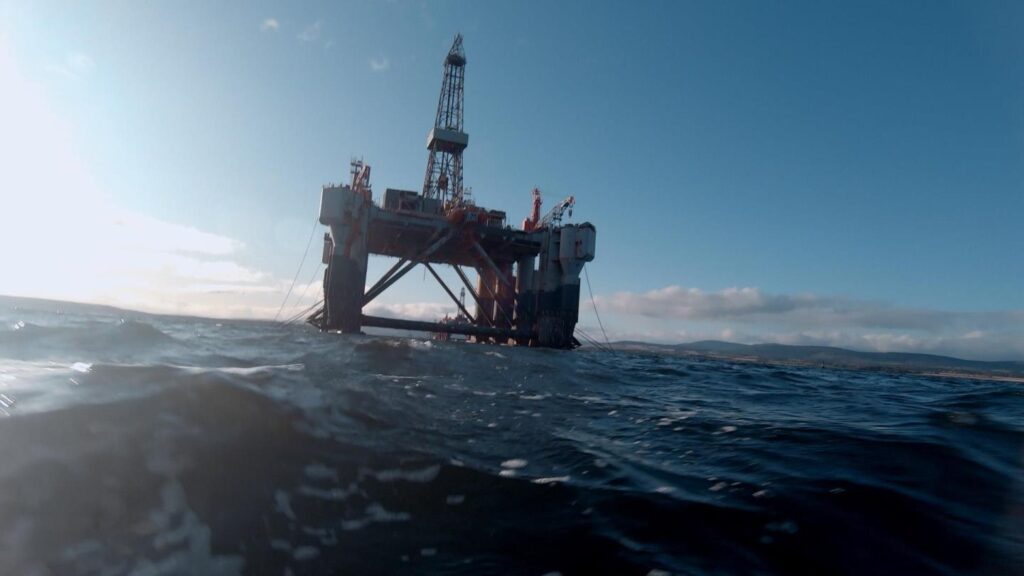
‘The Oil Machine’ // ACMI, Docplay & EFFA
‘The Oil Machine’ was attention-grabbing.
Most people would assume that horror is the scariest genre of film. Films can be made to appear scary through the use of suspense, supernatural or unanticipated fright. Some wonder if there is a genre more frightening than horror. A lot would say that genre is called documentary, though what they mean is reality. Nothing is scarier than things that are happening in real life and the 2022 documentary ‘The Oil Machine’ directed by Emma Davie shows us that. The irony is consumable media such as film and television are a coping mechanism we use to distract ourselves. Before the screening of ‘The Oil Machine’, we were greeted by two representatives of ACMI, and the screening service Docplay, ironically hosting media I use to distract myself.
Seeing films at ACMI is a true experience, their setup is an incredible multisensory machine that transports you into the film. A cinema like this is a perfect setting for ‘The Oil Machine’. From a cinematography perspective, this film opens as an utter masterpiece. Instantly, we are transported to the humongous crashing waves of the North Sea, the violent brackish waters seem to go on for miles. The vivid, never-ending wormhole presents the North Sea as inhospitable for human life as possible, when the hideous oil towers are put into our view, everything seems out of equilibrium.
The film then cuts to the lively prosperity of swinging 60s England and the prosperity of the North under fossil fuels. Back then, science focusing on the dangers was at its infancy, and the UK was still struggling with the financial impacts of the Second World War. Most people don’t realise that rationing lasted until the mid-1950s and much of the county, particularly the North and Scotland were experiencing poverty. This portion focuses on the voices of those who did the gruelling work, as we witness the horror they were sent to do. Then we learn the horrific physical and emotional scars they endured, scenes depicting the horrific conditions these workers were placed in, we admire their bravery, and sympathise with the fact that North Sea Oil at least seemed to provide financial stability to the North.
It is frustrating to be trapped on the West Gate Bridge for hours as Extinction Rebellion protesters park a bus across it, And it’s somewhat enraging to hear that a painting by a struggling outsider had a can of soup poured on it by ‘Just Stop Oil’ protesters. These actions attempt to break the machine, though their impacts seem to only affect those as powerless as myself. The truth is that in almost all cases, the people impacted by intrusive action have no say in the matter of doing something about climate change. The vast crashes of waves truly make us, the viewer feel powerless in the Oil Machine, powerless because it emphasises that those who could make change are simply choosing not to. We can do our best, but even that is often too difficult. An incredible part of this film is that it includes interviews with the CEOs of these oil companies. The audience laughed at their statements saying that they supported a move to renewables. The interviewees put these talking heads on the spot and coaxed them into painting a portrait of their thoughts.
What we hear from climate scientists is that it’s now or never. Sections of SouthEast Asia and Scandinavia have ended up underwater and much of the world’s coastal cities are next, and it won’t be long until we are swept up into the crashing waves and into oblivion. Climate activists, particularly youth climate activists are rightfully terrified of this happening, they are thoughtfully interviewed, simply simplifying the discussion of the climate scientists into the phrase ‘do something now’.
As the film drew longer, the interludes of scenery decimated by oil became exhausting. The runtime of this film could have been cut by thirty minutes if much of these shots were cut. At one point, the film cut to a scene depicting car recycling which did not fit with the scope of the narrative. Without the experience of seeing it at a place like ACMI, I feel that this film would become boring.
‘The Oil Machine’ makes it very clear that our reliance on mined resources is most likely inescapable, this is achieved through imagery where a plastic disposable lunch box is replaced by a metal one. Whilst mining iron is also detrimental to the environment, the product has a much longer lifespan. The desired outcome of this documentary is just that, balance. Whilst we will see a world powered by renewables, we won’t see a world free of oil. Oil and gas are finite resources, though their applications are infinite, a world both with and without them seems impossible.
‘Still Dry White’ performs in the Archive Room at Trades Hall until Sunday 7th March 2024. To book tickets and read more about the show, visit their website.






